Archives
Minnesota doctor granted 30-day reprieve from deportation
Dr. Guan Lee, who has spent the past 18 years in MN, was ordered to return to Malaysia, but got a last-minute reprieve.
Federal judge blocks Trump’s third travel ban
On October 17, a federal judge blocked the Trump administration from implementing the latest version of the president’s controversial travel ban.
Press release: Southern Poverty Law Center to Immigrant Law Center of Minnesota: Community is most important word
October 13, 2017 – ” The most important word here tonight is community,” Joseph Levin, co-founder of the Southern Poverty Law Center (SPLC), told hundreds of supporters of the Immigrant Law Center of Minnesota (ILCM). “Welcome immigrants – documented, undocumented – into the community. These are really strong people. That’s how they got here, how most of our ancestors got here. … Support from the community is the most critical thing that any of us can do.”
Speaking at an October 12 benefit for ILCM, Levin recounted his early days growing up in segregated Alabama. He was a Jew and Morris Dees, who later co-founded SPLC with him, was a Baptist. Despite this major difference, they had more in common: “We were both white, went to the same all-white high school, the same all-white university, the same all-white law school.” Back then, Levin said, “Every white person I knew was a racist. So was I.” Change came slowly and gradually to him, as the civil rights movement changed the country.
Now he sees the country going backwards, with “invigoration of extremists and extremist groups from the Klan and neo-Nazis to radical anti-immigrant groups,” and with “overt bigotry … justified by our president, his vice president, and their various surrogates.”
“What country is this?” Levin asked. “I thought the stories of bigotry and hate were relegated to the fringes of our society. I was wrong. I see, smell, and feel the 1950s and 1960s again.”
Ibrahim Hirsi of MinnPost moderated a panel discussion following Levin’s keynote, with Senator Patricia Torres-Ray; Maya Salah, an attorney with Lindquist & Vennum and ILCM board member; and ILCM Executive Director John Keller.
Torres-Ray described the impact of current anti-immigrant policies and rhetoric on families, with undocumented parents living in fear and worrying about how to plan for their U.S. citizen children’s futures. She described isolation as another consequence of today’s anti-immigrant policies, with people uncertain about whether they can trust their neighbor, teacher, doctor or church.
Asked for a hopeful message, attorney Maya Salah held up a small booklet. “This is our hope,” she said. “I love the constitution. It is one of the reasons I went to law school. … That’s where the hope is for me. That ultimately we can use the law to get to where we want to get to as a nation.”
Another reason for hope, said John Keller, is that the overwhelming majority of people in the country support the Dream Act. Five major networks, including Fox, polled people on whether they support a path to citizenship for those who entered as children. “Every one of the networks was in 80 percent support level, including Fox,” he said.
The Dream Act, Keller concluded, “is the gateway to deeper systems change in the face of people who don’t want it to happen.”
Keller thanked the people who support ILCM, both those at the benefit and those who could not be there. He listed concrete steps to take in support of immigrants:
- Talk to people you disagree with – civilly.
- Ask people who live in Minnesota Representative Tom Emmer, Jason Lewis, and Erik Paulsen’s districts to call their representative every single day. First on the Dream Act and then on immigrant justice. “I am convinced that Minnesota will be the state in the Midwest where we have unanimous, bipartisan Congressional support for the Dream Act.”
- Ask businesses and organizations to publicly support the Dream Act and immigrant justice. Go to FWD.us and see the list of more than 800 corporations, which includes Minnesota-based Best Buy, General Mills, Target, and the Minnesota Chamber of Commerce.
- Donate and volunteer for an organization that supports immigrants and refugees.
Finally, Keller said, “We don’t have the luxury of fatigue. We cannot be overwhelmed by the snowstorm of hate, of anti-immigrant, of anti-everything. We are the ones who have to be strong and not give up.”
DACA rally draws huge crowd in Worthington
Annotated White House Immigration Principles & Policies
The National Immigrant Justice Center has annotated the text of Trump’s ‘principles’ regarding immigration – if you want specific rebuttal of any one of these ‘principles,’ this is a good place to begin.
Jacobo Gabriel-Tomas forced to leave family, community in Worthington
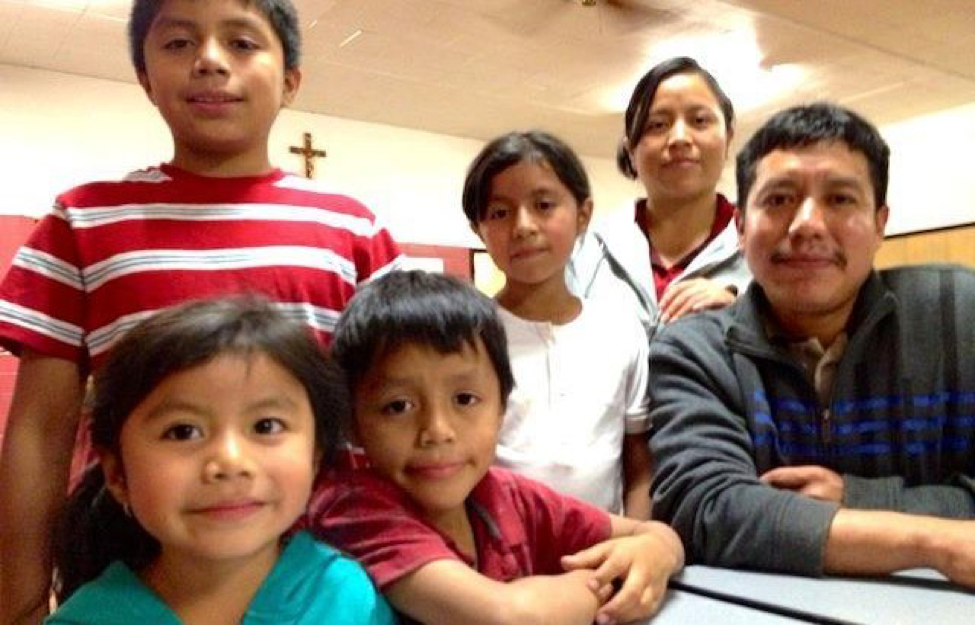 The U.S. Immigration and Customs Enforcement agency (ICE) denied a stay of deportation to Jacobo Gabriel Tomas on September 25, ordering him to leave his home, family, church, and community in Worthington and go to Guatemala—the country he fled almost 25 years ago. Despite an amazing outpouring of support from community and elected officials, ICE refused to extend prosecutorial discretion.
The U.S. Immigration and Customs Enforcement agency (ICE) denied a stay of deportation to Jacobo Gabriel Tomas on September 25, ordering him to leave his home, family, church, and community in Worthington and go to Guatemala—the country he fled almost 25 years ago. Despite an amazing outpouring of support from community and elected officials, ICE refused to extend prosecutorial discretion.
“Jacobo is the kind of person we should welcome to legal residence and citizenship, not someone who should be sent to an uncertain future in a country he has not seen since he was a child,” said ILCM Executive Director John Keller. “If he does not deserve leniency and exercise of discretion, who in the world does?
“The cruel impact of this decision on Jacobo and his family and community demonstrates the need for reform of a broken immigration system. There is neither sense nor justice in ripping apart a family and expelling a productive, contributing member of our community.”
“This decision demonstrates the heartlessness of rote application of immigration laws,” said Kathy Klos, an attorney with the Immigrant Law Center of Minnesota (ILCM) who has represented Jacobo for years. “Justice requires thought and compassion, not robotic application of the harshest penalties possible under law.”
Jacobo has lived in the United States for almost 25 years, for all of his adult life. In 1992, at the age of 16, Jacobo fled Guatemala to escape the violence of civil war and genocide. He applied for asylum but, after many years of fighting within the system, ultimately was denied in 2002.
By that time, he was married, with two children and another on the way. Jacobo’s four U.S. citizen children depend on him and love him very much. He has worked hard, and his only brush with the law apart from minor traffic tickets came when he was charged with using false work documents twelve years ago. He paid a fine for that, pleading guilty to two misdemeanor offenses.
Before and after that time, he worked hard, paid taxes, and earned a place as a valued leader in St. Mary’s Catholic Church and in Worthington, the community where he lives and owns a home. U.S. immigration authorities recognized that he was a good person and not a priority for deportation. They exercised prosecutorial discretion to grant him work authorization and year-to-year withholding of deportation.
This year, all that changed. Under the Trump administration, orders went out to make nearly everyone a priority for deportation. Jacobo’s deep roots in Worthington, his years of contributions to the community, his children—that all meant nothing any longer.
Over the last several months, ICE has denied his multiple requests for prosecutorial discretion. In September, ILCM filed a motion for a stay of deportation, based on three grounds:
- Jacobo faces possible life and death circumstances in Guatemala, one of the most dangerous countries in the world;
- Jacobo is an upstanding community member and father, who is an asset, not a threat to the United States; and
- Jacobo is an original DREAMer who will qualify for the DREAM Act that President Trump and leaders of Congress are committed to passing.
St. Paul ICE Field Office Director Scott Baniecke denied that motion. Senator Al Franken advocated strongly with ICE Acting Director Thomas Homan, but Homan refused to consider or even acknowledge any of the reasons for exercising discretion in Jacobo’s case, and refused to reconsider the field office decision.
In a press release, the Immigrant Law Center of Minnesota said:
“On behalf of Jacobo and his family, thank you to all of the hundreds of people who called and emailed the ICE office this week, asking them to exercise prosecutorial discretion and allow Jacobo to remain here with his family. We appreciate your support and concern. We appreciate the efforts made by Senator Al Franken, Senator Amy Klobuchar, Congressman Tim Walz, Minnesota State Representative Rod Hamilton, Worthington Mayor Mike Kuhle, and other elected officials, community members, and supporters.”
Soccer? You betcha!
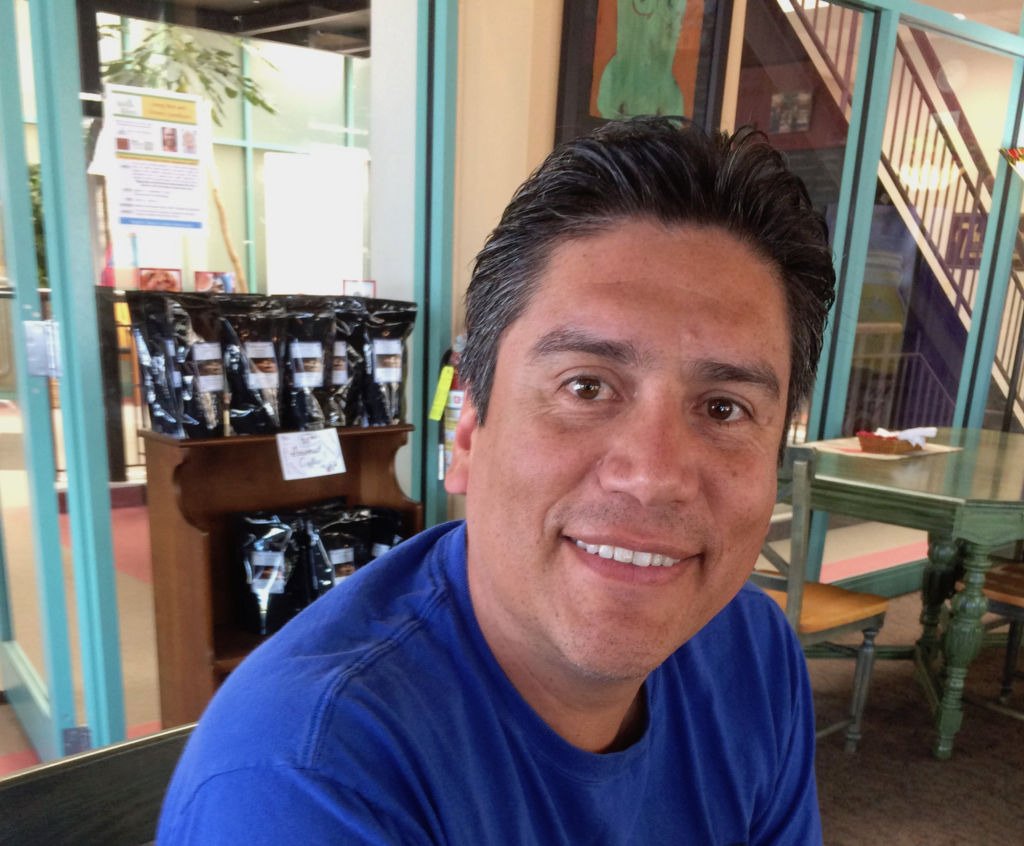
When Edel Fernandez arrived in Minnesota, he came with a college degree and work experience. According to the Pew Research Center, that puts him among the 21st century immigrants, who are “the most highly educated in history.” New immigrants today are more likely to have college degrees than people born in the United States.
In the 1990s, Fernandez was working in a university in Guanajuato, Mexico. That’s when he met a foreign exchange student who stayed with his parents, a college student from Minnesota. “Katie was convinced she needed to bring back a souvenir,” he jokes, “and that’s why I am here!”
When he moved to the United States in 2000, he went to an employment agency to look for work. “After they looked at my resume and noticed that I was fluent in English, they hired me,” he recalls. His English was very good, he says, but “I had to work on my uff da and you betchas!”
Soon he was recruited away from his first job by the WorkForce Center in Willmar. After a while, he “got promoted from employment coordinator to migrant labor representative.” That seemed a strange choice, since the city he comes from is three or four times the size of Boston, and he had no experience with either agriculture or migrant labor.
“I think I got it by default because I looked to them like a migrant farmworker,” he says. Nonetheless, his work made the Willmar office number one in the state for matching jobs with people, and “they sent people from Chicago to audit us because they couldn’t believe our success rates.”
Still, he missed working in a university setting. When Ridgewater Community College started a soccer program, he saw a chance to combine his passion for soccer with a connection back to higher education. Coaching took him from Willmar’s Ridgewater to Austin’s Riverland, where he now combines soccer coaching with advising students in programs that include Cycles for Success and the Be Your Best Summer Academy.
“We have seen a 94 percent success rate over 11 years in the summer academy,” he says proudly. That means students ages 16-22 successfully completing the program and going back to high school or on to college in the fall.
Soccer remains his passion, whether playing, coaching, refereeing, or watching. His team at Riverland has international students from around the world, Chile to Montenegro. Last year the team made the play-offs for the regional championship, placing second in Region 13 of the National Junior College Athletic Association.
He lives in Owatonna with his wife, who teaches in middle school there, and their “three beautiful daughters,” ages six to 13. “It has been very eye opening to raise three bicultural girls,” he says. “Unfortunately, because of the political world we live in, we have been exposed to many things that I don’t wish my kids were experiencing.”
Edel misses his parents and brother, who live in Mexico — “I’m the only crazy one who lives in this winter wonderland” — but the family has visited Mexico often.
“I have always thought you become what you are surrounded by,” Edel says, and he loves the energy of the young people he works with every day.
Solomon Paul welcomes immigrants to Austin
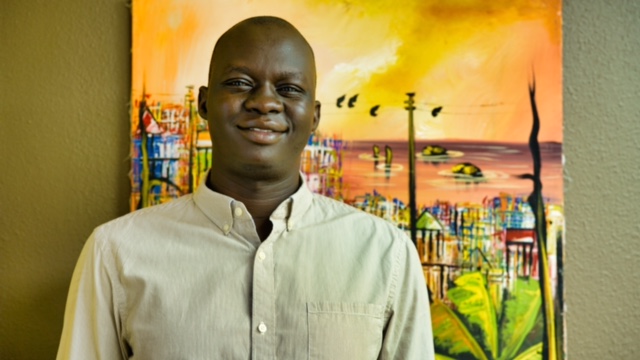
Since he arrived in 2005, Solomon Paul has seen Austin’s population grow and change. Back then, the two biggest immigrant groups were Latin Americans and African immigrants, like himself, from Sudan. Today, he says, “the Asian community has surpassed the African population in Austin, because of the influx of Karen and Karennis from out of state and from St. Paul – from as far as North Carolina, Iowa, Colorado, Texas, and Illinois.” The Karen and Karenni immigrants fled Burma, lived for years or decades in refugee camps in Thailand, went through extensive and prolonged vetting by the U.S. government, and then were resettled in various U.S. cities.
Paul himself came to the United States as a refugee from Sudan in 1999, settling first in Houston, Texas and relocating to Portland, Maine. He moved to Minnesota with his wife and three children in 2005, partly to be close to the Mayo Clinic and partly because there was already a Sudanese refugee population in this part of the state. He worked in Albert Lea at Good Samaritan nursing home, went to school at Winona State University and worked in a group home there, and worked as a court interpreter all over Minnesota and also in Iowa, South Dakota, and as far away as Illinois. Now he is the executive director of Austin’s Welcome Center.
Austin is a place for secondary resettlement. That means immigrants who come to Austin usually come from some other city in the United States where they settled first. Those who have now come to Austin came for jobs, Paul says. With an unemployment rate hovering around two percent, Austin needs workers, and immigrants come for jobs.
Often the husbands come first, Paul says. “After he finds the place welcoming enough to bring children here, then he brings the entire family.” What makes the city welcoming? It’s little things, Paul explains – like finding an interpreter for visits to the doctor’s office or school. Language and housing are the two biggest challenges for immigrants moving to Austin.
The Welcome Center helps all of these new residents settle, assimilate and become part of the community. “When they find a supporting cast of staff at the Welcome Center,” he says, “then they know this is where they want to raise a family.”
“Austin today is not the same Austin that I came to,” Paul says. “Back then I would see apprehension in the faces of local people. You would go to some business areas here and you would feel that you are not welcome. You would see that apprehension.” Today, he says, Austin “has changed ten-fold for the better.”
Mower County’s immigrant population has grown to more than 11 percent over the past 25 years, turning around its decades-long population decline. Austin’s immigrants are diverse: they come from Mexico, Burma, Sudan, Ethiopia, Togo, the Ivory Coast, Benin, Liberia, and many other countries around the world. The largest part of Austin’s immigrant population is Latino, with Asians edging out Africans for second place.
Paul thinks they made a good choice, saying that Austin is a good place to live. “St. Paul is confusing – here it is easier,” he says with a smile. He’s doing his part to make Austin a more welcoming community for everyone.
Farming runs in the family at La Sureña
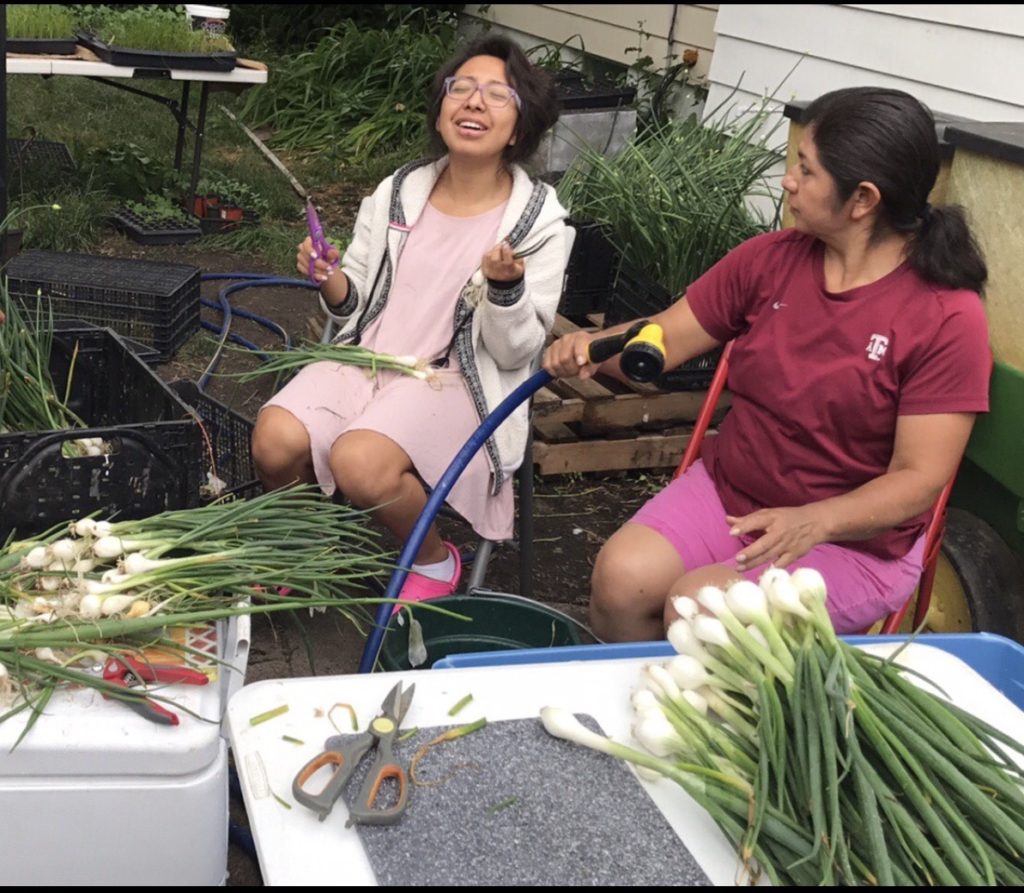
“I always loved farming,” Cira Paz Valbuena declares. “All my life, I was used to eating fresh vegetables.” She grew up in Mexico, where her family raised their own food. Now an Austin resident, she returned to growing food for the family here.
About 16 years ago, when her daughter enrolled in preschool and she began taking English classes, Cira heard about the garden plots next to Woodson. She signed up right away. While she started out growing food for the family, she couldn’t stop there.
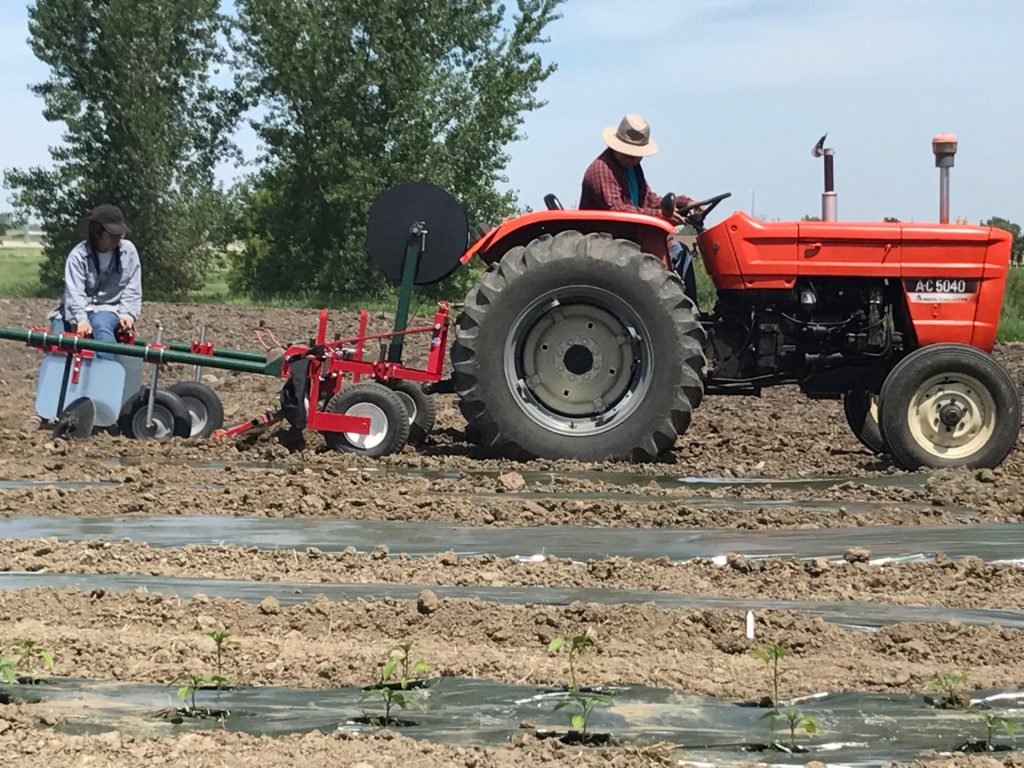
“We were a family of four, but she raised enough food for 20,” recalls one family member. Four or five years ago, Cira saw a notice about learning to raise food for sale to others. She was ready.
The whole family joined in the new farm project. Since then, their 0.8 acre plot has expanded to include almost seven acres in two different locations.
They are growing on only three of the seven acres, Martin says. Even with a tractor, growing fresh vegetables is labor intensive and time-consuming.
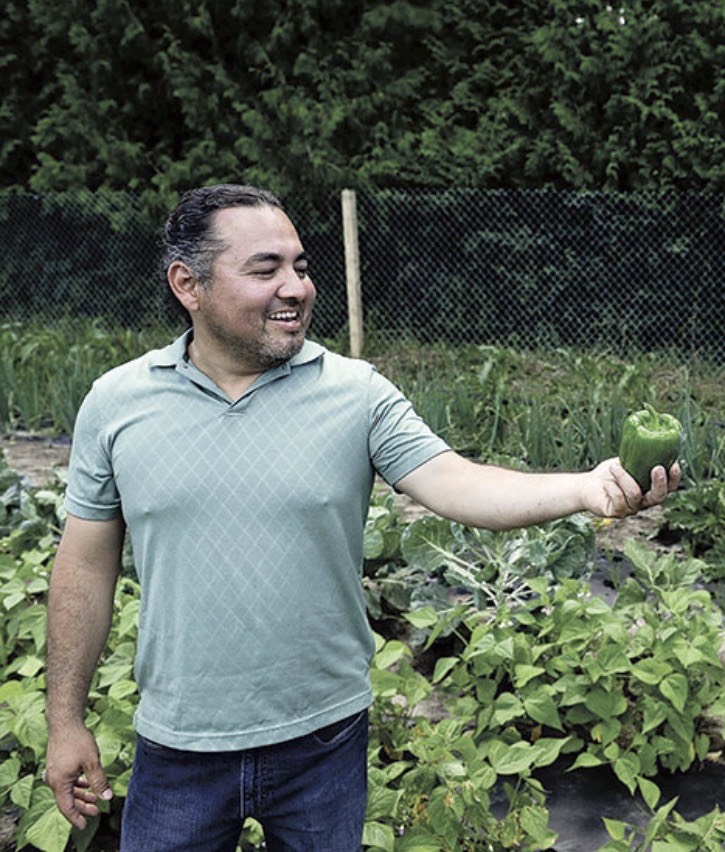
“Summer doesn’t wait,” Cira says. “It is heavy work, and you have to like what you are doing to do it well. Hard work doesn’t scare us away.” She adds, teasing, “Except for Julieta!”
She and Julieta both laugh. The whole family – Julieta and her brother, stepfather Guillermo Martin, and Cira’s parents – now work with Cira in the small farming operation they named La Sureña.
Their crops include green beans, jalapeño peppers, roma tomatoes, bell peppers, cilantro, tomatillos, cucumbers, and dragon tongue beans. In Austin, HyVee is one of La Sureña’s customers, along with some local restaurants and families.
Martin still works full-time off the farm, at International Paper. Growing up in Texas, he had “no farming background, and farming was the last thing I ever thought of doing.” He prefers dealing with “paperwork, certifications, all that stuff.”
Martin credits the Latino Economic Development Corporation (LEDC) and the Austin Area Minority Business Project for guiding him through the maze of regulations and procedures necessary for farmers who grow vegetables for the commercial market. Some rules seem obvious: washing produce before sale, keeping records of any fertilizers or herbicides used. Some are less obvious: “If an animal goes into the field,” he explains, “you have to find where he came in and try to close that spot.” He also keeps records to assess which plants and varieties produce the biggest harvests and the highest return on investment.
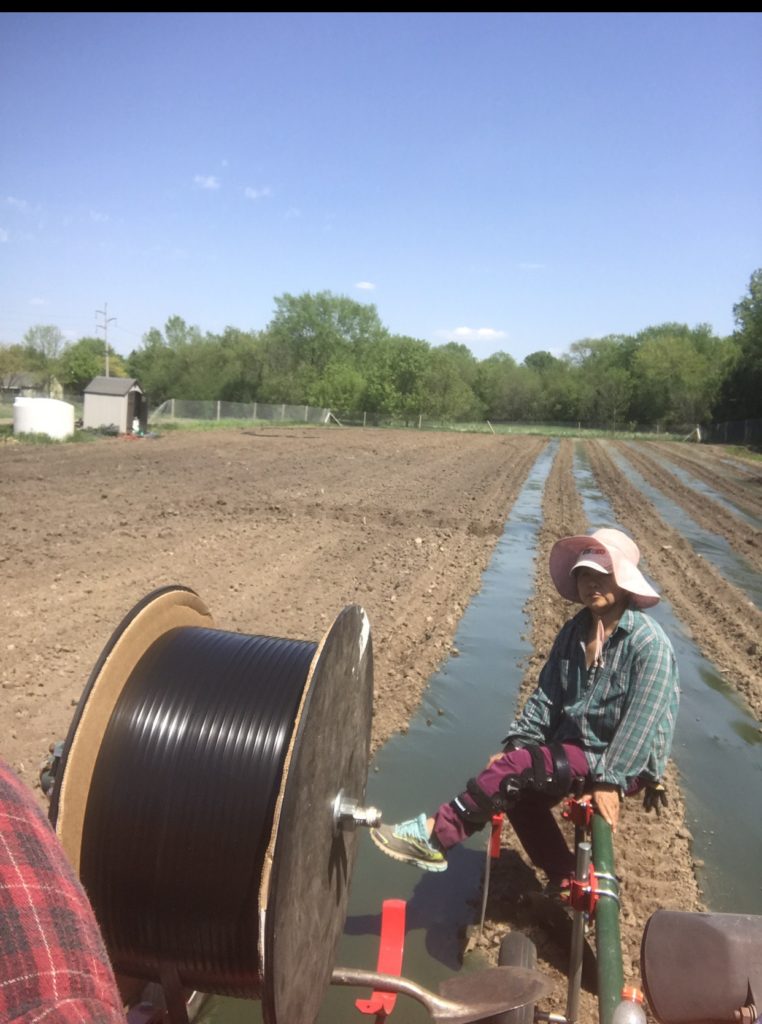
La Sureña is one of eight member farms in the Shared Ground cooperative, which helps to market the produce they grow. Besides marketing to stores and restaurants, Shared Ground sells Community Supported Agriculture (CSA) shares. Someone who buys a CSA share gets a weekly box of fresh produce during the season.
Shared Ground and LEDC open new horizons through classes and workshops on topics such as high tunnels, irrigation lines, pollination and cover crops. La Sureña is using a mixture of oats and wheat as a cover crop to improve the soil.
Thinking about the future, Cira says she would like to own land instead of renting, and to have all of the land in one place so they don’t have to travel back and forth from one plot to another. Maybe some chickens, she says, and “maybe a pony for Julieta.”
Julieta represents the youngest generation in the family farming operation. While her mother and grandparents came from the state of Guerrero in Mexico, Julieta grew up in Austin, and likes the diversity of the community. She fits in work in the fields around her other two summer jobs at Subway and the Assisted Living Center. During the school year, she’s away from home, a junior at Knox College in Illinois.
When Julieta thinks about the future of the family’s farming, she sees getting more land, having a more organized operation, and maybe expanding deliveries. Apart from that, she says, it would be good to get more involved in the community and “maybe to have classes to teach people about food. Food brings people together.”




